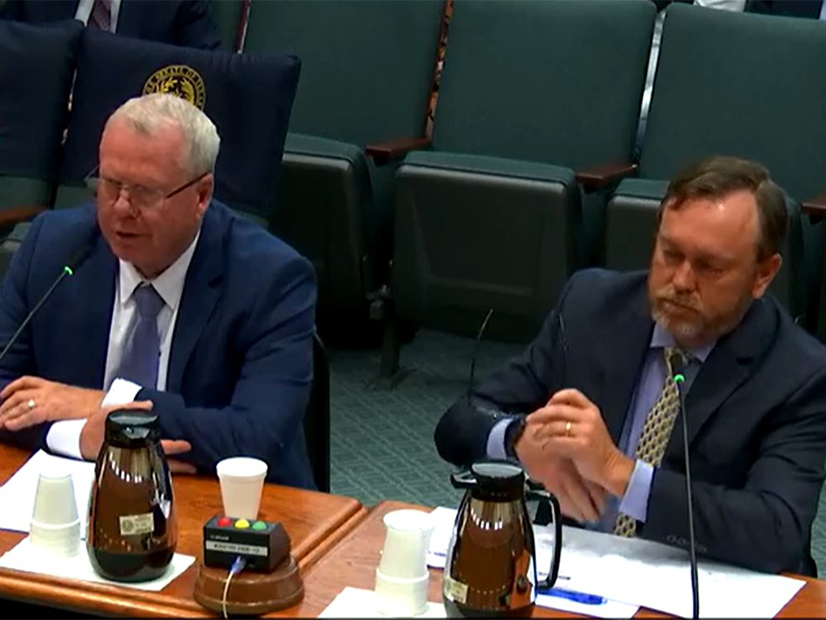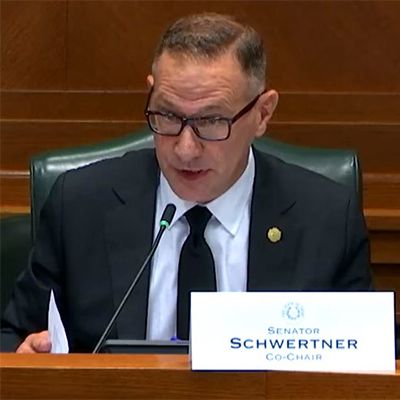
Texas lawmakers charged with overseeing the state’s $5 billion fund for new gas-fired generation took aim this week at the consulting firm managing the program.
During a public hearing Oct. 8, the Texas Energy Fund (TEF) Advisory Committee roasted Deloitte representatives for missing an apparently fraudulent loan application that accounted for 13.2% and left a nearly 1.3-GW hole in the fund’s portfolio.
Deloitte principal Rod Kleinhammer, a senior partner overseeing the firm’s Texas business, defended his staff’s work. He said they could have been more intensive in performing due diligence of the 72 applicants for TEF funds. Deloitte conducted what amounted to cursory background checks of the applicants and found no negative results, Kleinhammer said, and added it intended a deeper dive after arriving at its shortlist of 17 projects deserving of loans.
“We should have accelerated some of the additional risk and reputational checks we had planned for due diligence to occur prior to the release of the 17 Texas energy fund loan applications being made public,” he told the committee, reading his short, prepared statement. “We’ve modified our processes and are confident the safeguards we have in place will continue to assure that no entities will be approved for funding before a rigorous and thorough review of the applicants and sponsors has been completed.”
That may not be enough.
Lt. Gov. Dan Patrick (R), one of the state’s most powerful political leaders, posted a statement after the hearing calling Deloitte’s failure to catch the sketchy application a “blunder.” He said the Public Utility Commission should follow through on its demand to claw back at least 10% of Deloitte’s contract and for the legislature to review the state’s other contracts with Deloitte, which average about $250 million annually, according to Kleinhammer.
“Our grid needs more dispatchable power as quickly as possible, and the Texas Energy Fund loan program is the most expeditious way to get more dispatchable megawatts online” he said. “Deloitte has only slowed down this important program. They need to correct their errors now or be gone.”
The application in question was proffered by Aegle Power, which said NextEra Energy was a party to the application, which the Florida company has denied. It also turned out that Aegle’s CEO, Kathleen Smith, had pleaded guilty in 2017 to embezzling a “significant” amount of money from a company that was trying to build a power plant in Corpus Christi, Texas. (See Texas PUC Rejects Possible ‘Fraudulent’ Loan Application.)
“The lack of just basic due diligence is astounding to me,” state Sen. Charles Schwertner (R), who co-chairs the advisory committee, told Kleinhammer. He noted Smith’s name was “all over the application” and received affirmation from the Deloitte rep.
“And no one bothered to interview or Google her name?” he asked incredulously. “This is the second-largest, 1.2-GW, second-largest project in the Texas Energy Fund. Is it astounding that it wasn’t a baseline like, ‘Who am I dealing with?’”
Schwertner recalled an earlier conversation with Kleinhammer, in which they discussed Deloitte’s mantra of KYC (Know Your Client).
“You were like, all giddy about it, almost,” Schwertner said. “Do you know Aegle Power?”
“I do now,” Kleinhammer responded. “Now that I know what I’m looking for, it is very easy to find out, sir.”
“What do you mean, what you’re looking for?” Schwertner replied, not hiding his frustration. “’If they’re a convicted felon, I should probably not advance them.’ Is that what you’re looking for? Do we need to spell it out for you?”
Smith had agreed to attend the hearing, but Schwertner said she pulled out Oct. 7 because she said she couldn’t leave Florida because of Hurricane Milton’s approach.
Sitting next to her empty chair, Mitchell Ross, general counsel for NextEra Energy Resources, the competitive business for the giant Florida company with about a $160 billion market cap, said the subsidiary never committed to or applied for any project seeking Texas Energy Fund support.
He said discussions were held with Aegle, but that no equity commitment was ever made. Initial conversations began with Aegle’s investment banker in May, but by July, Ross said, NextEra’s deal team had decided to end the negotiations, partly because of Smith’s criminal history. He said a May letter submitted to the PUC and claiming a $252 million equity commitment from NextEra was fraudulent and has been reported to the U.S. Attorney’s Office.
“We do not support the application, and I agree that false statements and fraud have been committed against the state of Texas,” Ross said.
As if that weren’t enough, Coronado Power Ventures notified the PUC that the air permits Aegle said it had secured from the Texas Commission on Environmental Quality and the U.S. EPA actually were issued to its La Paloma Energy Center in South Texas. The project since has been canceled.
Coronado Power CEO John Upchurch said the application was made without his company’s “knowledge or consent.”
In a strange twist, Upchurch was CEO and Smith president at Chase Power from 2008 to 2012, when the embezzlement occurred. Federal authorities charged both with filing false invoices and using their company credit cards for personal travel, country club memberships and other expenses. Like Smith, Upchurch pleaded guilty to the charges.
“Deloitte’s failure to uncover the falsified application presented by Aegle Power, whose CEO was previously convicted of embezzlement, is outrageous, and the [PUC’s] advancement of this unvetted project is extremely troubling,” Patrick said in his statement.
PUC Chair Thomas Gleeson offered his apologies, saying the commission had “too much of an arm’s length relationship with our contractor.”
“I should have ensured we were more heavily involved in the review,” he told lawmakers. “Ultimately, it is my responsibility to make sure that Deloitte is doing what they need to do.”
The commission said it will strengthen the oversight process to address the issues that led to the Aegle Power application’s acceptance and denial. Executive Director Connie Corona said staff will meet with the 16 remaining applicants and conduct site visits to verify their legitimacy.
The PUC and Deloitte are negotiating over the 10% clawback of the latter’s contract, which is valued at $73 million over four years. An addendum could up the spending to $107 million.
Kleinhammer said the two sides are close, but Gleeson offered a different perspective. He said there will be no negotiation over the 10% number, which amounts to $7.3 million.
“That is $7.3 million, which is 10% of their base contract. That number is non-negotiable. It is not moving down,” Gleeson told the committee. “So, from my view, there is no ongoing negotiation. There is a number that needs to be met, and when it is, we will present you with an agreement of that number.”
Gleeson said the commission also has referred the matter to the Texas attorney general’s office, citing the “lies and false statements” in the application.
“It is fraud,” he said.




